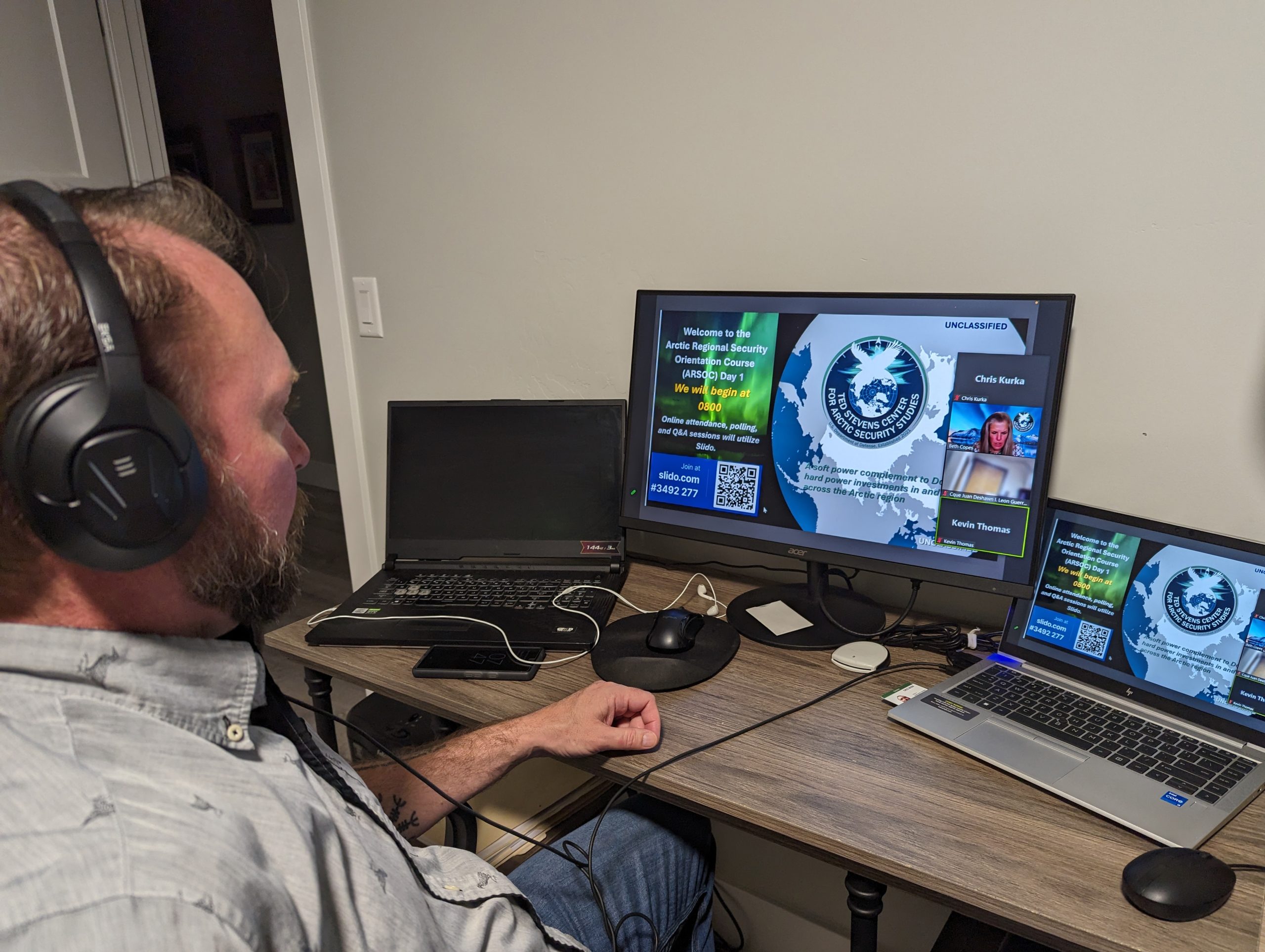
JOINT BASE ELMENDORF-RICHARDSON, ALASKA — Editor’s note: This is part 1 of a 4-part series about Ted Stevens Center’s School for Arctic Security Studies courses.
The Ted Stevens Center for Arctic Security Studies Arctic Regional Security Orientation Course held their final session for 2023 last week.
The five-day virtual course, which drew more than 150 people working across five different countries, focused on historical, environmental, commercial, geopolitical, and strategic issues concerning the Arctic region, in order to encourage discussion, intellectual curiosity, and critical thinking among security and defense practitioners. As Matthew Bell, Dean of the School for Arctic Security Studies explained, ARSOC gets participants to think and engage in discourse on Arctic security above a level they would ordinarily do in their everyday jobs.
“In order to advance Arctic awareness and dissuade potential concerns, I believe it incredibly important we start with open and engaging discussions,” said Bell.
ARSOC has three primary objectives: Prepare Department of Defense personnel for assignments in the Arctic region; promote a collaborative network of Arctic security practitioners; and propose cooperative, practical solutions to security challenges in the Arctic Region to include policy and strategy changes for the future security environment, obstacles, and enablers of security cooperation.
To prepare participants for assignments in the Arctic region, ARSOC provides a baseline understanding on strategic issues, trends, and challenges in the Arctic region. Through breakout groups, keynote speakers, and discussion panels practitioners are provided an opportunity to critically and objectively analyze key security dynamics and trends in the region, to include the rapidly changing operating environment impacted by the changing operational environment.
As participants reach the final day of the course, they have an opportunity complete a capstone Arctic security dilemma where they demonstrate their enhanced knowledge and shared understanding of countries and communities of the Arctic region, while also showcasing an understanding of the domestic and international laws and norms of cooperation in the Arctic region.
In line with the primary mission of the Ted Stevens Center, ARSOC focuses on developing relationships among a community of security practitioners on whom participants can reach out to better accomplish their institutional missions.
By enhancing civil-military relations and security sector cooperation and effectiveness as well as supporting good governance and the rules-based order in the Arctic, ARSOC aims to build strong and sustainable, domestic and international networks of civilian and military security practitioners.
“The intersection of human security and national security requires a whole of government, perhaps whole of nation effort, to fully address the challenges and opportunities we face in addressing Arctic Security,” Bell added.
Since the course’s establishment in March 2022, last week’s graduates are now a part of a global Arctic security network with more than 1000 alumni to date.
As the School for Arctic Security Studies continues to refine ARSOC and launch new educational courses, the Ted Stevens Center will continue to build a network of likeminded security focused professionals to increase regional collaboration to achieve a peaceful, stable, prosperous, and cooperative Arctic region.
To learn more about ARSOC or to sign up for the course visit: https://forms.office.com/g/Breh3G9vUH.
The 2024 sessions for ARSOC are currently scheduled for Jan. 22-26, April 15-19, July 15-19 and Sept. 16-20.
Christopher Kurka, a contractor for U.S. Army Japan, participates virtually in the Ted Stevens Center for Arctic Security Studies Arctic Regional Security Orientation Course on Oct. 30, 2023. The five-day course, which drew more than 150 people working across five different countries, focused on historical, environmental, commercial, geopolitical, and strategic issues concerning the Arctic region, in order to encourage discussion, intellectual curiosity, and critical thinking among security and defense practitioners. Since the course’s establishment in March 2022, last week’s graduates are now a part of a global Arctic security network with more than 1000 alumni to date. As the School for Arctic Security Studies continues to refine ARSOC and launch new educational courses, the Ted Stevens Center will continue to build a network of likeminded security focused professionals to increase regional collaboration to achieve a peaceful, stable, prosperous, and cooperative Arctic region. (DoD photo by Amber E. Kurka)
